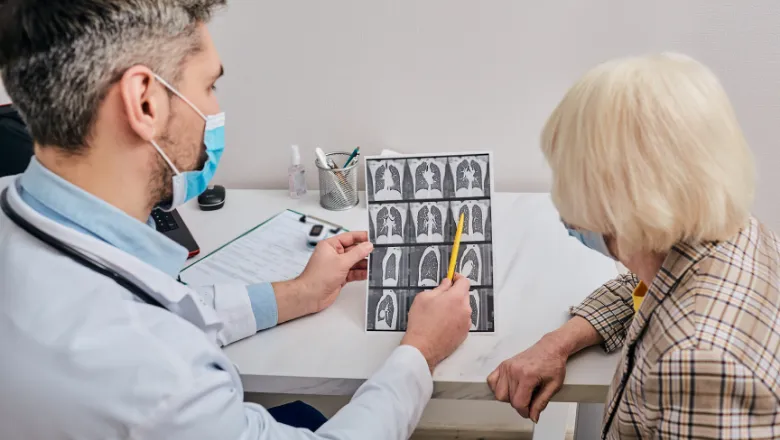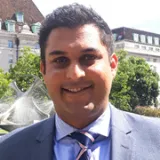I am very proud of how quickly our team has been able to progress this study from concept when the first wave hit to dosing patients with the cell therapy product. Our research is focussed on developing novel advanced therapies and their translation from the laboratory to the bedside and it has been fantastic being part of a truly translational piece of clinical research. Successful delivery of this experimental cell therapy into patients marks an important milestone in establishing its safety, before it is considered for treating larger numbers of patients who are affected by post COVID-19 fibrotic lung disease.
Mr Ashish Patel
15 July 2021
World's first cell therapy trial for post COVID-19 fibrotic lung disease
A first in human cell therapy trial for the treatment of post COVID-19 lung scarring has recruited and treated its first patients.

The Monocytes as an Anti-fibrotic treatment after COVID-19 (MONACO) cell therapy study is the world’s first Phase 1 trial for the condition that has advanced to a stage where it has been given to patients.
Early estimates indicate that 2% of all patients who had COVID-19, including those who were not hospitalised, will have suffered a degree of fibrotic lung scarring as a result of the infection. This estimate is even higher in patients who were admitted to intensive care. These statistics indicate that globally over 3.5 million people may have a degree of post COVID-19 lung scarring to date.
The study is led by Mr Ashish Patel, a Clinical Senior Lecturer within the King’s BHF Centre for Research Excellence, School of Cardiovascular Medicine and Sciences and a Consultant Vascular Surgeon at Guy’s and St Thomas’.
It looks at the safety and efficacy of using a novel cell therapy treatment to reverse lung fibrosis using the body’s own cells (monocytes and macrophages) which are engineered in the laboratory to have anti-fibrotic properties. With their name derived from Greek - where ‘macro’ means large, and ‘phage’ means eating, - macrophages are a type of white blood cell with the power to devour cellular and excess scar tissue formed in injured lungs as they heal during acute COVID-19 infection.
Lung scarring causes a significant decline in lung function, a long term debilitating reduction in exercise capacity and reduced quality of life in these patients.
The development of the MONACO Cell Therapy Study and production of the treatment were supported by the world class infrastructure and facilities of the NIHR Guy’s and St Thomas’ Biomedical Research Centre (BRC). The novel cell therapy used in this study was manufactured within the cutting edge facilities, and with the expert support of highly trained staff within the NIHR BRC’s Advanced Therapies Manufacturing platform at Guy’s Hospital.
Five patients with fibrotic lung disease following recovery from COVID-19, were the first people in the world to receive the experimental cell therapy treatment within the NIHR Clinical Research Facility (CRF) at Guy’s Hospital.
Clinical research within the NHS has adapted to address the unmet diagnostic and treatment needs of patients with COVID-19 - with regulatory and ethical approval processes just as thorough as pre COVID-19 - but significantly accelerated.
Prior to the pandemic, MONACO’s trial lead, Mr Patel was working alongside another vascular surgeon, Professor Bijan Modarai, with the aim of delivering these cells into the legs of patients with peripheral vascular disease to prevent amputation. Once the pandemic hit, and with an increasing number of patients who had recovered from COVID-19 infection presenting with post COVID-19 lung scarring, they saw the potential to re-purpose their therapy to potentially treat this lung scarring. With the generous permission of their funders - the Rosetrees Trust (who fund innovative research) - for the original study to be re-purposed, the MONACO Cell Therapy study was born.
Commenting on progress of the study so far Mr Ashish Patel said:
“I would like to extend my gratitude to the five incredible patients who have come through their severe COVID-19 illness and been so willing to participate in this first in human study. We could not have done this without their support.”
Commenting on the MONACO study Prof Ajay Shah, Interim Executive Dean, King’s College London, and Director, King’s BHF Centre for Research Excellence said:
This study is addressing a very important and currently unmet clinical need, potentially affecting a very large group of patients recovering from COVID-19. It provides a solid start to establishing the safety and efficacy of using novel cell therapy treatments to reverse lung fibrosis using the body’s own cells.”
Professor Ajay Shah
He added: "Within King’s College London and the King’s BHF Centre for Research Excellence we recognise the enormous contribution and value that clinician academics bring to the translation of research into clinical care. This work is a great example of academia and the NHS working as one - through the NIHR Guy’s and St Thomas’ Biomedical Research Centre, to deliver improved care for patients affected by post Covid-19 fibrotic lung disease.”


